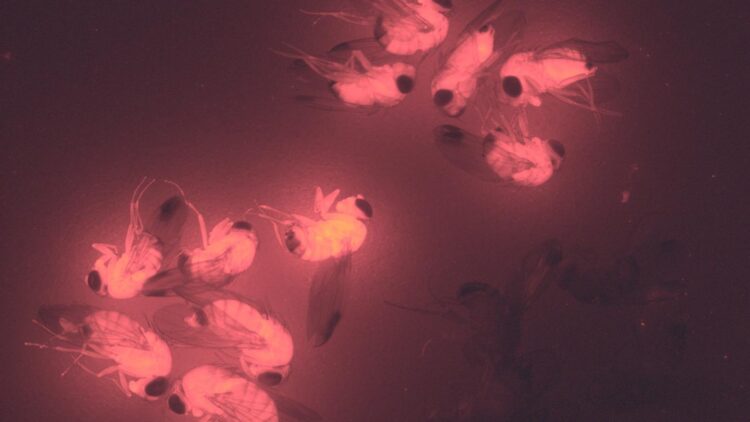Populations of Drosophila suzukii fruit flies – so-called “spotted-wing Drosophila” that devastate soft-skinned fruit in North America, Europe and parts of South America – could be greatly suppressed with the introduction of genetically modified D. suzukii flies that produce only males after mating, according to new research from North Carolina State University.
D. suzukii are modified with a female-lethal gene that uses a common antibiotic as an off switch. Withholding the antibiotic tetracycline in the diet of larvae essentially eliminates birth of female D. suzukii flies as the modified male flies successfully mate with females, says Max Scott, an NC State entomologist who is the corresponding author of a paper describing the research.
“We use a genetic female-lethal system – a type of sterile insect technique – that works when a common antibiotic is not provided in larval diets,” Scott said. “If we feed the antibiotic to the larvae, both males and females survive. If we don’t, almost no females survive.” Scott and collaborators previously showed success using a similar method in New World screwworm flies.
The modified flies overexpressed genes that cause cell death. Researchers used a fluorescent red protein to mark the presence of the female-lethal genes.
In the study, one line of flies grown without feeding tetracycline produced 100% males, while another line produced 98% males. Meanwhile, control fly lines grown with the antibiotic produced an approximate equal number of males and females.
“The technique worked more effectively than we expected,” Scott said.
The study also tested how the introduction of males with the female-lethal gene would affect unmodified populations in lab cages. In one test, it took 10 generations to eliminate all female offspring. In a larger test, researchers placed 1,000 modified males twice weekly into cage populations containing approximately 150 to 200 pairs of wild type flies. After eight weeks, the test cages produced no new eggs. Control cages continued to produce over 100 eggs per day at the end of the study.
The study shows that the genetically modified males both competed fairly well for the attention of fertile wild females and mated successfully with fertile females under laboratory conditions. Scott added that the study also highlights that the lethal-female gene was passed on effectively.
Next steps could include contained trials in large cages in an NC State greenhouse, Scott said.
The study was published online in the journal Pest Management Science. Fang Li, Akihiko Yamamoto, Esther J. Belikoff, Amy Berger and Emily H. Griffith co-authored the paper. Funding for the work came from the National Institute of Food and Agriculture, U.S. Department of Agriculture Specialty Crops Research Initiative under agreement No. 2015-51181-24252 and a cooperative agreement with USDA-APHIS (award AP17PPQS&T00C165)
###
Note to editors: An abstract of the paper follows.
“A conditional female lethal system for genetic suppression of the global fruit crop pest Drosophila suzukii”
Authors: Fang Li, Akihiko Yamamoto, Esther J. Belikoff, Amy Berger, Emily H. Griffith and Maxwell J. Scott, NC State University
Published: Online June 24, 2021 in Pest Management Science
DOI: 10.1002/ps.6530
Abstract:
BACKGROUND: Drosophila suzukii (Matsumura, 1931, Diptera: Drosophilidae) is a global pest of soft-skinned fruits such as blueberries, cherries and raspberries. Also known as spotted-wing drosophila, D. suzukii is native to Asia but is now widely distributed in the Americas and Europe and presents a serious challenge for growers. Genetic control strategies offer an environmentally-friendly approach for control of D. suzukii.
RESULTS: In this study we have developed transgenic strains of D. suzukii that carry dominant conditional female lethal transgenes. When raised in the absence of tetracycline, female D. suzukii die. We show that repeated releases of an excess of transgenic males can suppress D. suzukii populations in laboratory cage trials.
CONCLUSION: Our data suggests that the transgenic strain could provide an effective approach for control of this invasive pest of soft-skinned fruits.
Media Contact
Max Scott
[email protected]
Original Source
https:/
Related Journal Article
http://dx.





